People thought walking football was an April Fool’s joke when it first aired on Sky Sports News in 2017 – but its popularity has soared
WALKING football was launched in 2012 to combat loneliness in men over 50 and to promote more active lifestyles— but for some, it has provided them with a lifeline through the most difficult periods of their lives.
Today, it is one of the UK’s fastest growing-sports, with more than 60,000 participants of all ages, genders and abilities taking part each week.
The goal for everyone is to leave with a sense of achievement
Chris Davey
After a knee injury forced him to give up the beautiful game he’d spent his whole life playing, Chris Davey discovered a new passion.
The 56-year-old formed the Whitchurch Walking Football Club in 2018 and volunteers tirelessly to promote mental and physical wellbeing for everyone within his local community of Llanishen.
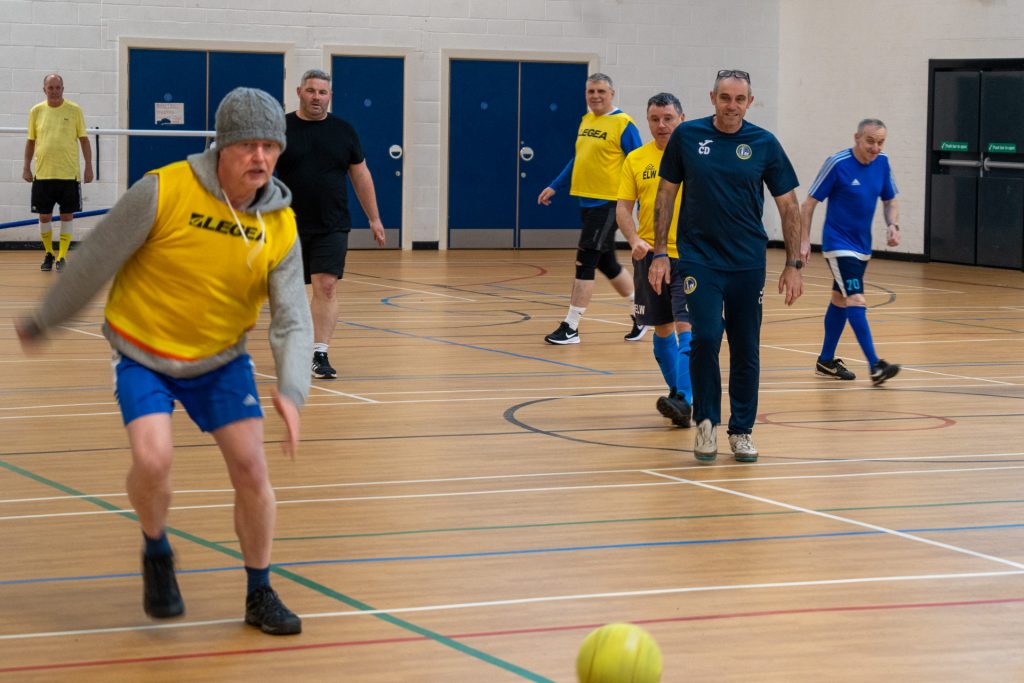
“My main motivation for establishing this initiative stemmed from my own experiences, and I found that walking football helped me cope with my type 1 diabetes and depression,” Mr Davey explained.
“I realised that it could offer similar benefits to others, providing a chance to improve their fitness while having fun and fostering social connections.
“I found that any issues you come with before starting a game, within the first 60 seconds of playing, you start to forget.”
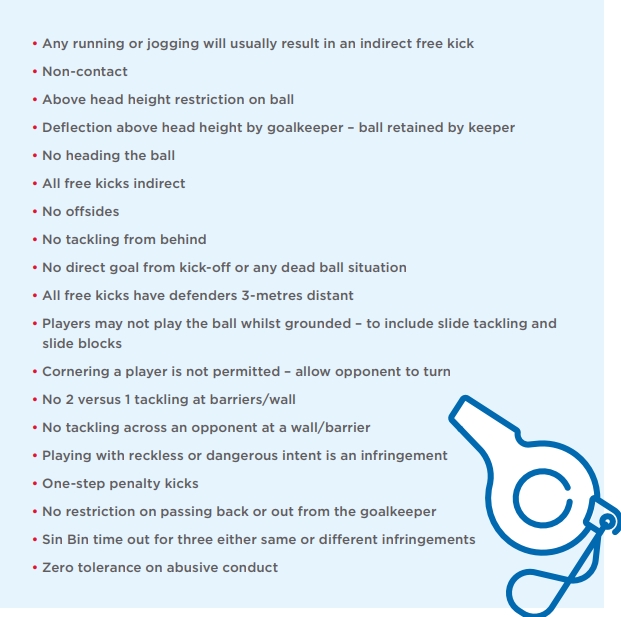
The rules differ from traditional football, with an emphasis on ball control and teamwork.
Games vary in length but are typically divided into two or four periods lasting between five and 30 minutes.
Image: The rules of walking football. Credit: The WFA
Mr Davey holds a UEFA C Licence, a coaching qualification that includes training in safeguarding, first aid, and promoting a healthy lifestyle. He also holds a certification in mental health awareness within sport.
“The goal is for everyone to leave with a sense of achievement, whether it’s making a good pass, scoring a goal, gaining the confidence to tackle, or simply leaving with a smile on their face after a hard week,” he said.
I’m almost glad that I was diagnosed with Parkinson’s Disease, because I’ve finally grabbed life by the horns
Paul Leverett
As a non-contact sport, it draws people from all walks of life, including those overcoming life-changing disabilities.
Paul Leverett retired at 50 years old, having worked as the Lord Mayor’s secretary for Cardiff Council.
What he hoped for, a carefree retirement spent with his wife, two children and three grandchildren, was turned on its head when he was diagnosed with Parkinson’s Disease at the age of 61 – in the same month the Covid-19 outbreak started.
“When you’re diagnosed you think it’s the end of the world, but you have two ways of going about it. You either go down the negative path, or you go down the positive path,” he explained.
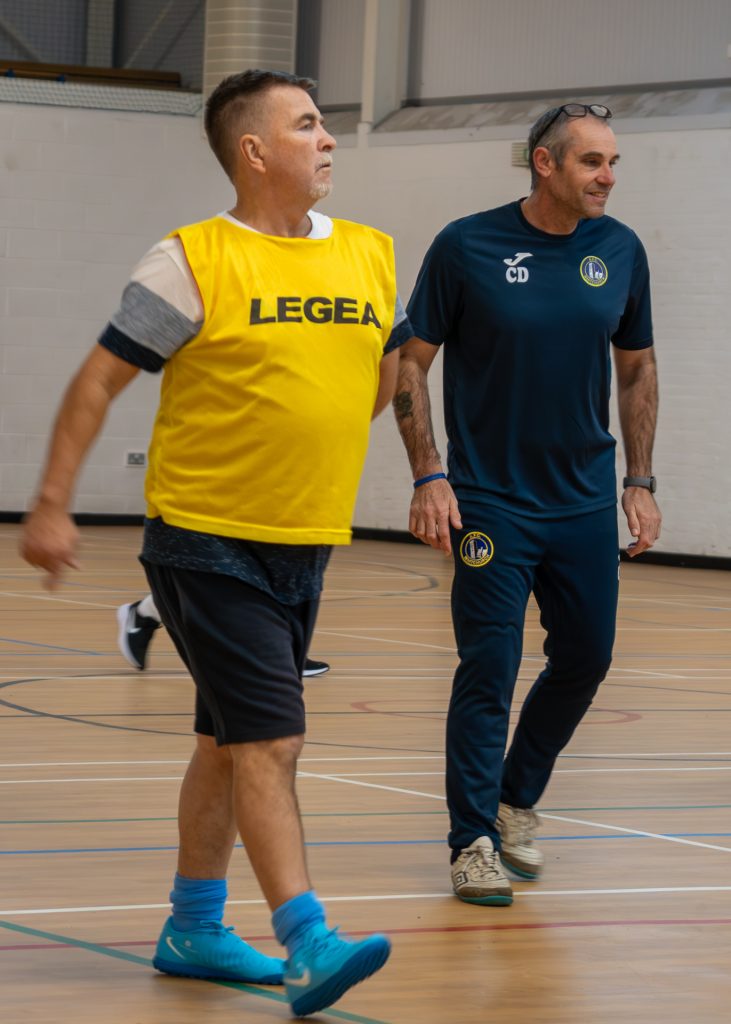
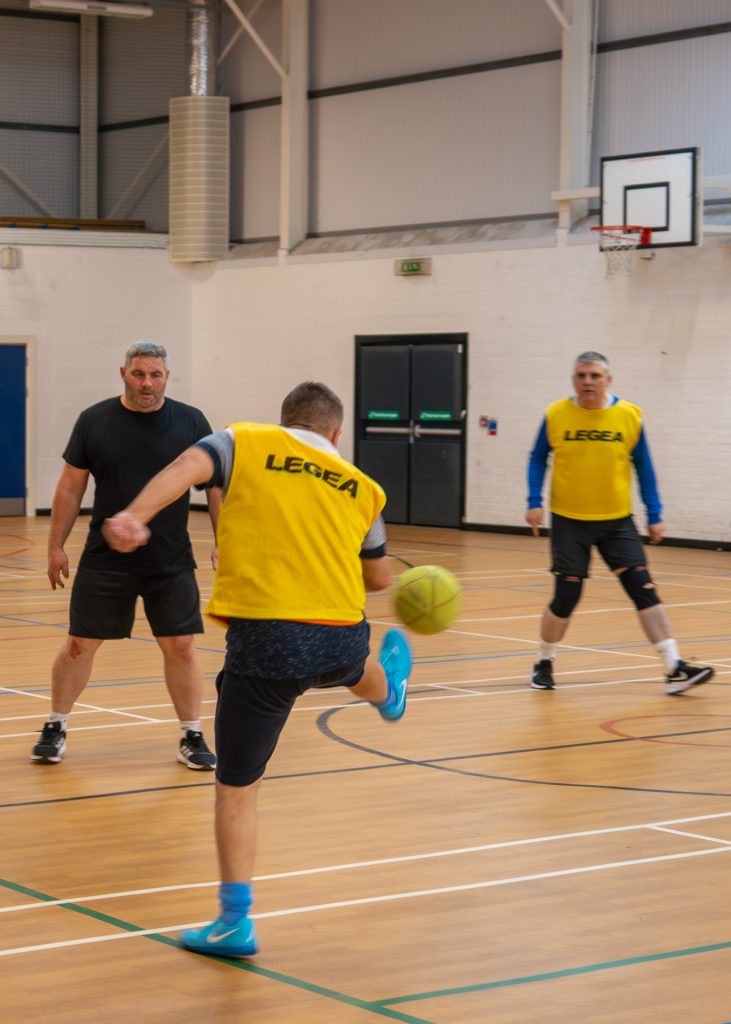
Images: Paul Leverett, showing off his new blue trainers, is determined not to let his condition impact his life. Credit: Joe Hearn
“Unfortunately for several years, I went down the negative one. During Covid, there was nothing to do but sit around and think about what had happened to me.
“After Covid I began to come out of my shell. I contacted Chris to enquire about walking football and they welcomed me with open arms. It was a complete revelation.”
Now aged 65, Paul is determined not to let Parkinson’s Disease define his life. As well as walking football, he participates in yoga, table tennis and golf – activities that have played a key role in helping him manage his condition.
“I’m usually not a team person, and other sports I’ve played, especially golf, I have found quite isolating.
“But with organisations like walking football, I have found nothing but positivity and a community that wants to help you wherever you go. I really owe it to the club and Chris.
“I’m almost glad that I was diagnosed with Parkinson’s Disease because I’ve finally grabbed life by the horns, whereas before, I wasn’t making the most of the life I had,” he said.
It should be promoted as something that brings people together
Neil Gibson
Neil Gibson, 54, a retired journalist is married with two children and was diagnosed with type 2 diabetes 10 years ago.
“The sport has been instrumental in helping me control my health better since I started four years ago. My blood pressure is lower, my cholesterol is lower, and I found that my diabetes is under control,” he explained.
“During a game, you’re walking about 7,000 to 8,000 steps, and it’s a decent amount for someone like me who isn’t particularly sporty.
“And from a mental health perspective, the endorphin rush you get when you’re committed to something and feel like you’re making a real impact has been amazing for me.”
Walking football offers far more than just physical benefits. “I wasn’t born in Cardiff, and I didn’t have a lot of friends before I started with walking football. It should be promoted as something that brings people together, as there’s a great deal of camaraderie involved,” Mr Gibson said.

“When you’re facing challenges in life, I believe it’s invaluable to talk to someone who isn’t directly involved in your life.
“This gang of people that I now call my friends are people I know I can go to for anything,” he added.
It’s just a really nice bunch of people who accept you for who you are
Diane Crone
Much has changed since the sport emerged in 2012, and more women are taking to it than ever before.
Professor Diane Crone teaches exercise and health at Cardiff Metropolitan University and played traditional football at high level for much of her early life.
“Unfortunately as time went on and I got slower, I decided to retire from football at the age of 30. But I have always missed the thrill of it,” the now 57-year-old said.
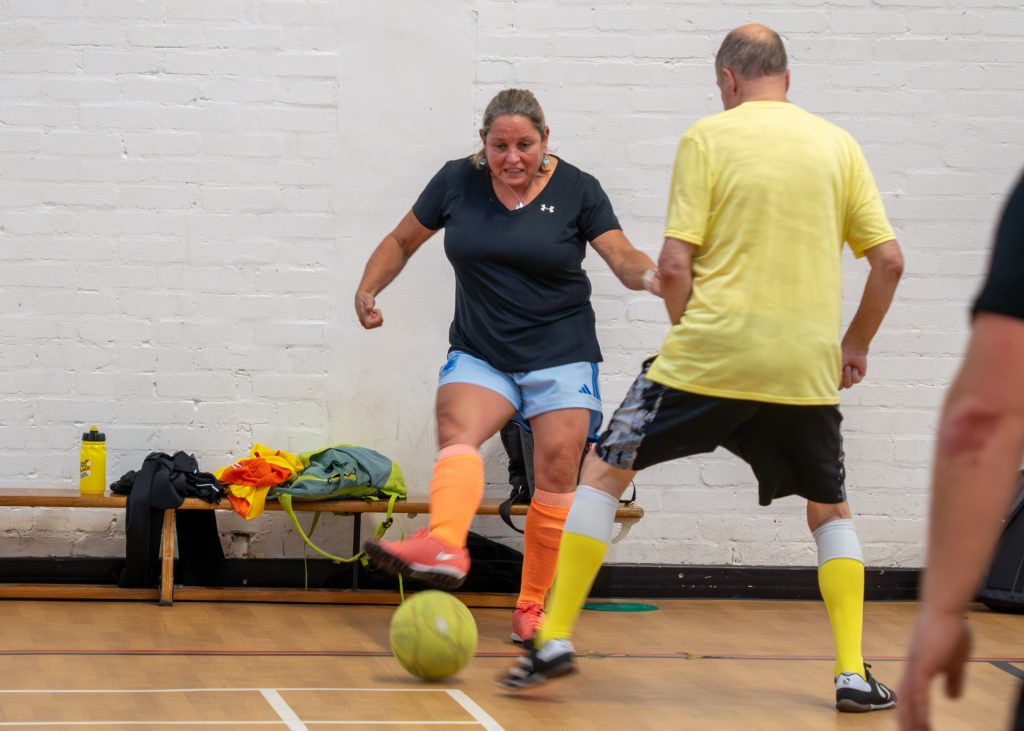
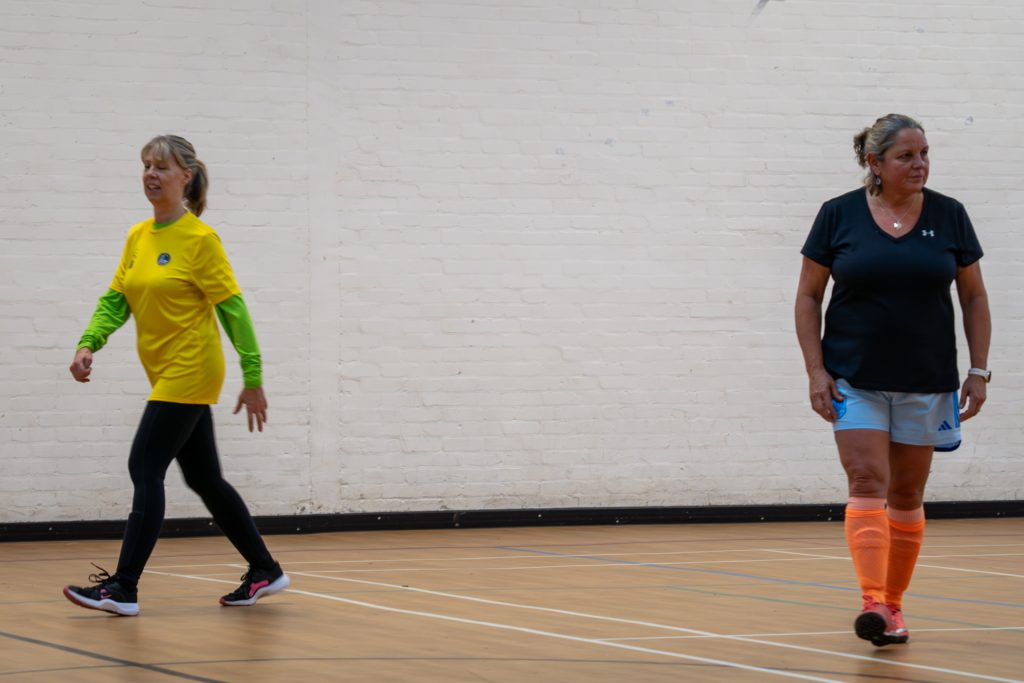
Left: Diane Crone returned to walking football this year after retiring from traditional football aged 30. Credit: Joe Hearn
Above: Vanessa Howells didn’t even like football before she started playing. Credit: Joe Hearn
“I got involved with walking football in June, and it’s nice that there are lots of different levels of experience and standards, but everyone respects your ability.
“It’s just a really nice bunch of people who accept you for who you are.”
Vanessa Howells, 56, has been playing for 11 months and didn’t like the sound of it to begin with. “It was my friend who told me about it,” she said. “I told her walking football sounds really boring, I don’t even like football.
“But I went along and I absolutely loved it. It would be nice for a few more women to come and play, and I’d say to them if you’re thinking of joining, you don’t ever feel excluded.”
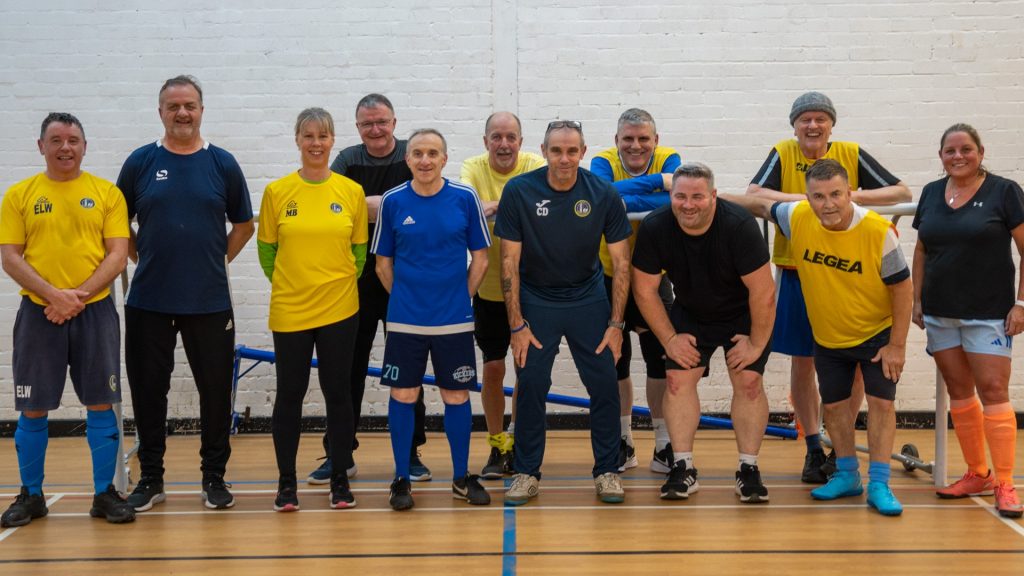
Grassroots sports such as walking football continue to make a positive impact within local communities – but financial challenges lie ahead.
Appearing at the Culture Committee in the Senedd on October 24, the chief executive of the Welsh Sports Association Andrew Howard spelled out the situation.
He said: “The sector has broadly been dealing with reduced cash and real term budgets on an annual basis since at least 2012, with just a few years of increased spend during the Covid-19 Pandemic.”
Despite these pressures, Mr Davey is optimistic about the future of the sport he loves and continues to work on growing it week by week.
The group meets on Wednesdays from 7pm to 8pm at the Llanishen High School Sports Hall and on Sundays at 11am at the Powerleague pitches on Manor Way.
Each session costs £5 per person, or there is an option to pay £20 a month for as many sessions as you like.
“All the money goes towards the pitches and the halls that we hire out, and the cost of the equipment such as footballs and training tops,” Mr Davey said.
“It keeps the walking football alive basically, and there is no profit involved in any of it, it all goes back into the team.”
- If you would like to get involved, or for any more information, contact Chris Davey at walkingfootball@afcwhitchurch.org



